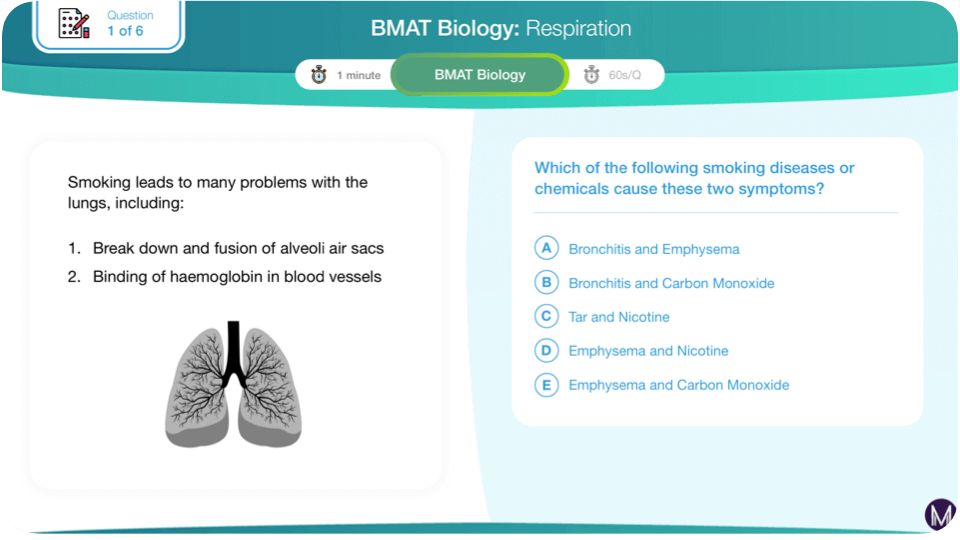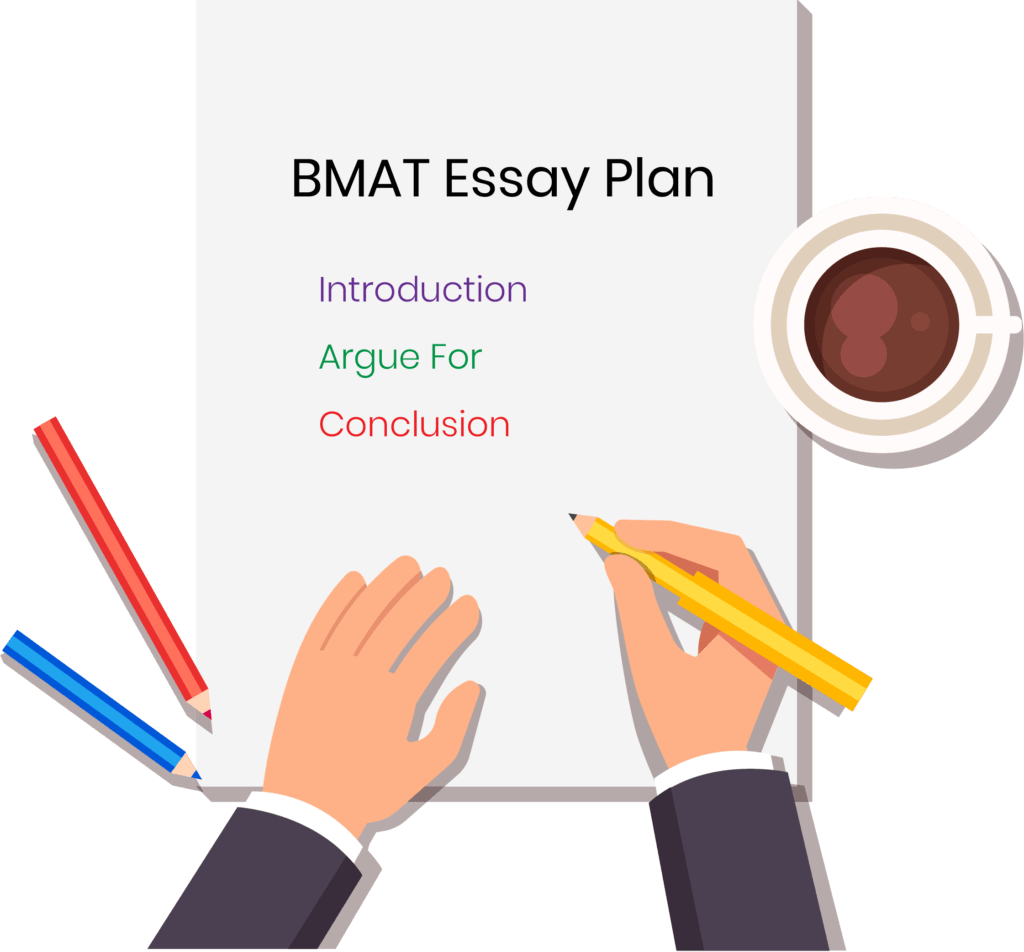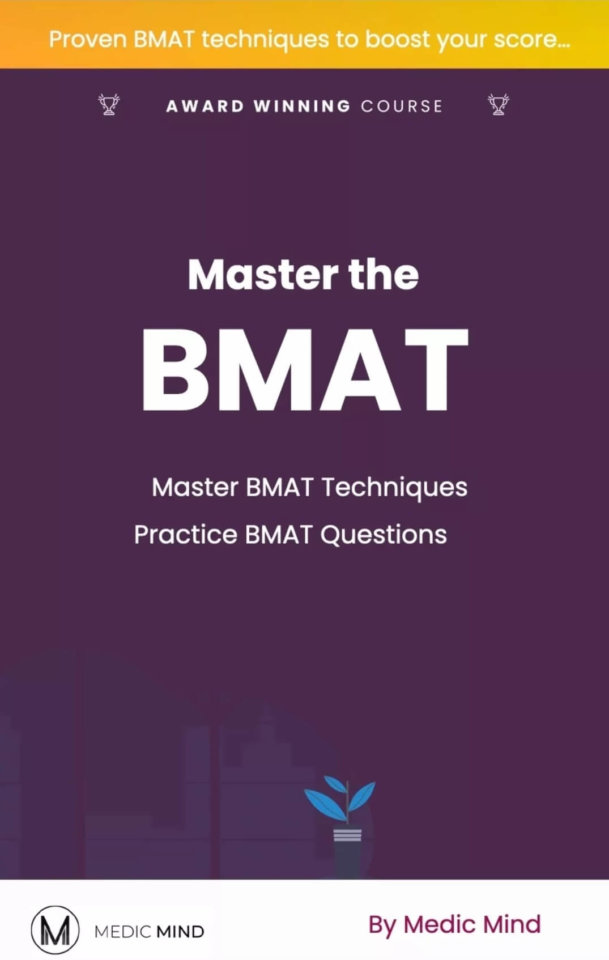Loading...


BMAT 2023: What is the BMAT?
BMAT 2023: Introduction
The BioMedical Admissions Test, or BMAT 2023 as it is more commonly known, is one of the admissions tests that some universities use for your application to medical and health-related courses.
It is separate from the UCAT and tests different skills. The BMAT tests your ability to apply scientific and mathematical knowledge, as well as critical thinking, problem solving and written communication in the form of a short essay.

BMAT 2023 Sections
Section 1: Aptitude and Skills
This BMAT section tests your skills in problem solving and critical thinking. It consists of 32 multiple choice questions and you are given 60 minutes to complete this section.
Section 2: Scientific Knowledge and Applications
In this BMAT section your ability to apply scientific knowledge is tested. Section 2 consists of 6-7 questions on each of biology, chemistry, physics and maths. The level of science is usually covered in school by the age of 16 (GCSE or IGCSE level equivalent). For this section there are 27 multiple choice questions, and you have 30 minutes to complete them.

Section 3: Writing Task
In the final section of the exam, you will be tested on your ability to select, develop and organise ideas, and your ability to communicate them in writing concisely and effectively. For this task you are to answer one question from a choice of three questions, and you have 30 minutes to complete your answer.

What are the BMAT Universities?
| Name of BMAT University | Courses requiring BMAT . |
|---|---|
| Brighton and Sussex | A100 Medicine |
| Cambridge | A100 Medicine |
| Imperial College London | A100 Medicine |
| Lancaster | A100 Medicine & Surgery A104 Medicine & Surgery with a Gateway Year |
| Oxford | A100 Medicine A101 Graduate Medicine Entry BC98 Biomedical Sciences |
| UCL | A100 Medicine |
Key Dates for BMAT Universities 2023
There are usually multiple sittings of the BMAT, with the two UK test dates being in September and November, and further dates for international medical schools. For 2023, the test dates are in March and October. Make sure to check if the universities you are applying to need the BMAT as you will need to be registered and pay the associated costs for your exam prior to sitting.
The registration dates for BMAT 2023 are below. Please note that registration for the March BMAT sitting has now closed.
| Date | Event |
| 1 September 2023 | Registration opens Test centres can register candidates from this date |
| 15 September 2023 | Deadline to apply for modified papers (e.g. enlarged print) |
| 29 September 2023 at 18.00 (BST) | Deadline for test centres to register candidates Deadline to apply for Access Arrangements (e.g. extra time) Deadline to apply for test voucher code* |
| 18 October 2023 | Test date |
| 24 November 2023 | Results released |
| 1 December 2023 | Deadline to apply for a Results Enquiry |
When do I sit the BMAT 2023?
This is different as usually there is a choice of two test dates. There are pros and cons for each of the BMAT test dates, and it’s worth considering which would suit you better if you’re given a choice. We go into this further in another article which you can find here.
How is the BMAT 2023 Scored?
BMAT Section 2
As with Section 1, each question carries a single mark. No marks are deducted for giving an incorrect answer. Your total raw mark is converted to a score between 1 (low) and 9 (high). The median score tends to be around 5.0 and normally corresponds to roughly half marks. 6.0 or more is an excellent score, achieved by around 10% of test-takers, and very few candidates score more than 7.0. Even so, you can get a few questions wrong and still achieve a perfect 9.0!
BMAT Section 3
Your essay will be marked by two examiners and who will each give you a separate score. They will be scoring you on two main aspects – one is for content (on a scale of 0 to 5). This is based on how well you’ve put your argument across, the number of examples you’ve used and more. The other score is all about the quality of language and is scored from A-E. This assesses your English grammar and sentence structure.
These two BMAT examiners’ scores will be averaged with 5A being the best score. In 2022, 3 was the commonest score for content and 5% of applicants scored 4 or more.
You can find out more here in our Section 3 Guide
How do I Prepare for the BMAT 2023?
BMAT Section 2
The most important thing you can do for Section 2 is download the official specification as this will tell you exactly which topics will be covered. In our experience, Physics tends to be the biggest obstacle course for most however it’s vital to remember that only 25% of the content will be on Physics. Take a look at our BMAT Physics guide for more tips.
We recommend visiting our past paper compilations where we’ve put together a list of questions which come up most frequently and provided explanations for each question.
BMAT Section 3
This can be the trickiest part of the exam for most but the best thing you should do is write lots of practice essays. Practice writing these on the specimen paper so you can get used to the test conditions. You should also aim to try and get someone to read over it if you can. You should aim to write essay plans for all the previous essay titles to help you get into the swing of things.
It goes without saying that you should be doing lots of wider reading on topics like current affairs, science and ethics. Start doing this early to avoid cramming at the last minute. Take a look at our section 3 guide for more tips.

Frequently Asked Question
🔍 What is the BMAT?
The BMAT stands for the BioMedical Admissions Test. It is a standardized test used by universities in the UK and around the world to assess the aptitude and knowledge of students applying for undergraduate courses in medicine, veterinary medicine, and related fields.
👨⚕️ Who needs to take the BMAT?
Students who are applying to certain universities in the UK and around the world for undergraduate courses in medicine, veterinary medicine, or related fields may be required to take the BMAT. It is best to check with the individual universities to determine their specific admissions requirements.
🤔 What is the format of the BMAT exam?
The BMAT exam is divided into three sections: Section 1 assesses problem-solving and critical thinking skills through multiple-choice questions on general knowledge, maths, and problem-solving; Section 2 assesses scientific knowledge and application through multiple-choice questions on biology, chemistry, physics, and maths; and Section 3 assesses written communication skills through a choice of one essay question from a range of options.
💻 Is the BMAT 2023 online?
The BMAT 2023 will be sat at testing centres around the UK. See the official CAAT website for more details.
🏅 What is a good BMAT score 2023?
Usually the average BMAT score is around 5.0, which equates to roughly half marks. The best 10% candidates will score around 6.0, and very few exceptional candidates will score over 7.0
📅 Will there be a September BMAT 2023?
There are two test dates in 2023. These will take place in March and October. The registration date for March has already closed. The registration date for the October BMAT 2023 is September (dates depend on whether you are applying for access arrangements). Please see the table above.
⚖️ Is the BMAT harder than the UCAT 2023?
The answer to this question relies on your own personal strengths and weaknesses. The UCAT and BMAT test different skills, so different students will find different parts of each exam more challenging. The BMAT requires GCSE science knowledge and includes essay writing so may be more suited to students with strong scientific reasoning. The UCAT relies on more cognitive skills such as abstract reasoning and doesn’t require any science knowledge.
🥋 How can I prepare for the BMAT?
There are a number of resources available for BMAT preparation, including practice tests, study guides, and online courses. It is also recommended to review the official BMAT website for test specifications and sample questions.
🎓 How do universities use the BMAT exam scores in the admissions process?
Universities use the BMAT exam scores as part of their holistic assessment of candidates. The scores are typically used to shortlist candidates for interview, and in some cases, to make offers.
Related
Related Articles
With over 1000 BMAT questions, mock paper walkthroughs, tips & advice, and more!
Get support with the BMAT essay through personalised support and advice
Personalised private lessons, tailored to your BMAT needs





Was this article helpful?
Still got a question? Leave a comment
Leave a comment
366 Comments
AnonymousMedic Mind Tutor
19 August 2021
Is the BMAT November 2021 exam online at a test centre or on paper? Thanks.
AnonMedic Mind Tutor
7 September 2021
online
AnonymousMedic Mind Tutor
24 October 2021
will data analysis be in 2021 bmat?
AnonymousMedic Mind Tutor
1 November 2021
will be given any paper for rough work as the question paper is online this year?